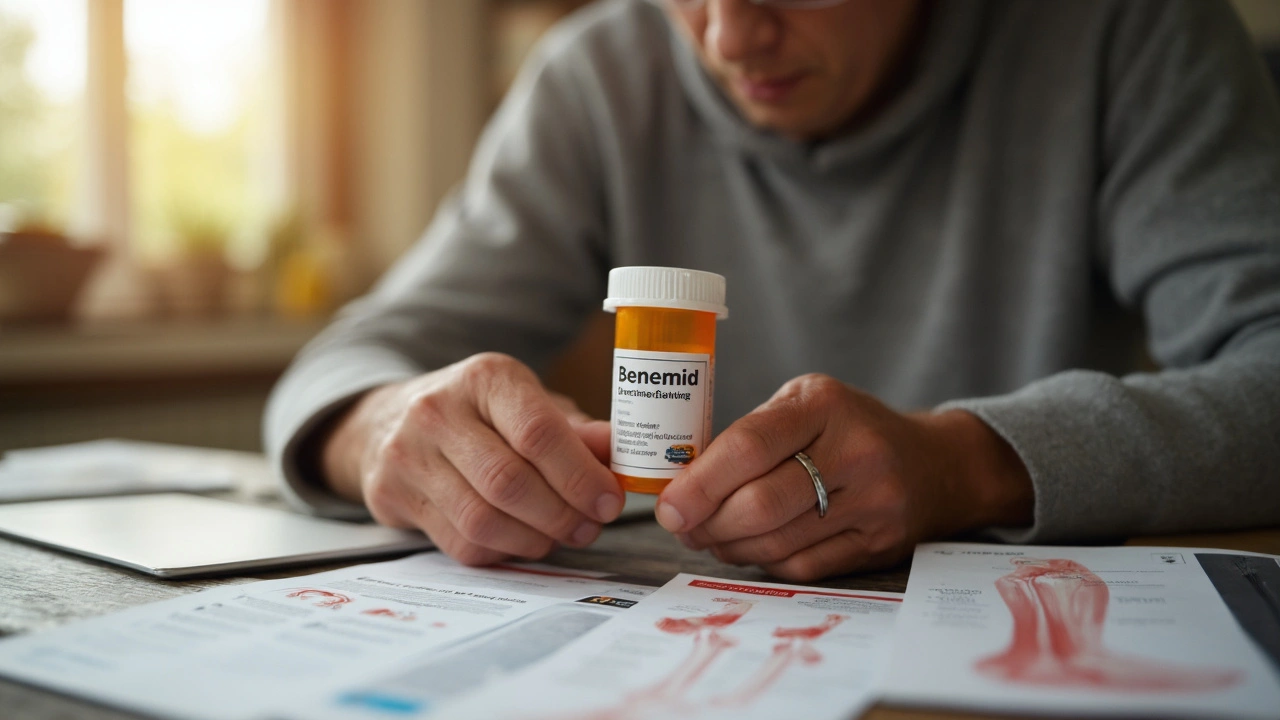If you’ve ever suffered the stabbing pain of gout, you know it’s like a thunderstorm sneaking up out of nowhere—relentless, sudden, hard to ignore. There’s a medicine out there called Benemid that’s been quietly helping people manage this agony for decades. You might not see it in flashy TV ads or trending TikTok health tips, but its story is packed with surprising facts, practical uses, and a few life-saving tips every gout sufferer (or their loved ones) should know. Today, let’s get into everything that really counts when it comes to Benemid—from what it is, how it works, and who it helps, to the stuff your doctor might forget to mention between appointments.
What Is Benemid and How Does It Work?
Benemid (also known as probenecid) isn’t the newest name in the pharmacy, but it’s held its ground since hitting the market in the early 1950s. Originally, scientists designed it during World War II to make antibiotics more effective, but they quickly realized probenecid had a unique superpower—it can flush extra uric acid out of the body. If you’ve ever felt the fire in your big toe at night or woken up with a swollen red ankle, you’re probably familiar with gout. That’s basically your body waving a white flag against an overload of uric acid, which crystallizes painfully in the joints.
So how does it work? In simple terms, Benemid blocks your kidneys from sucking uric acid back into your blood. Instead, that acid goes straight into your urine, and out it goes. Most folks with gout make too much uric acid or have trouble getting rid of it. Benemid helps tip the balance so those nasty crystals can’t pile up. Fun fact: Benemid doesn’t treat an actual gout attack right when it happens—it’s your “keep it from coming back” medicine, not your emergency fix.
Here’s how probenecid stacks up compared to other medications for gout:
| Medication | Main Use | How It Works | Common Side Effects |
|---|---|---|---|
| Benemid (Probenecid) | Gout prevention | Increases uric acid excretion | Headache, nausea, kidney stones |
| Allopurinol | Gout prevention | Lowers uric acid production | Skin rash, upset stomach |
| Colchicine | Gout attack relief | Reduces inflammation | Diarrhea, abdominal pain |
What sets Benemid apart? It’s one of the few medicines that actually helps your body get rid of uric acid, not just make less of it.
Who Can Benefit From Benemid?
Not everyone with gout gets handed a prescription for Benemid right away. Doctors usually reserve it for people whose uric acid levels stubbornly refuse to drop or whose kidneys still work well enough. Imagine you’ve tried allopurinol or a similar drug and it’s just not getting the job done—Benemid could be your next step. It’s usually recommended for adults (rarely for kids unless it’s a really unique case) and works best if your kidneys aren’t slacking off (creatinine clearance above 50 mL/min is usually needed).
One lesser-known but super cool use of Benemid: boosting antibiotics. Back when penicillin was gold, doctors figured out Benemid could help keep those antibiotics hanging around in your blood longer, so you’d get a stronger kick from the same dose. These days, that use has faded, but you might still hear old-school docs mention it.
Here are some specific scenarios where Benemid fits in:
- You get frequent gout flare-ups even though you’re avoiding purine-heavy foods and taking other meds
- Allopurinol and febuxostat give you nasty side effects
- Your uric acid is still sky-high despite lifestyle changes
- Your kidney function is good (ask your doc about your kidney numbers)
- You don’t get kidney stones easily
Certain folks should probably skip Benemid, like anyone with a history of kidney stones, people with severe kidney disease, and anyone allergic to probenecid or similar drugs. Also, if you have a blood disorder called uric acid nephropathy, steer clear.

How to Take Benemid Safely and Effectively
Popping a Benemid pill isn’t just about swallowing something with water. There’s an art (and a science) to maximizing its benefits and keeping yourself out of trouble. Most adults get a starting dose of 250 mg twice a day, then doctors might bump it up after a few weeks if your uric acid refuses to budge. The key is sticking with it—even if you’re feeling fine, don’t stop until your doctor says OK.
Here are some practical tips for taking Benemid like a pro:
- Drink at least eight full glasses of water a day—this helps keep uric acid diluted so those infamous kidney stones don’t sneak up on you.
- Take the pill with food or milk if your stomach gets upset easily.
- If you forget a dose, take it as soon as you remember, but skip it if it’s almost time for the next one. Don’t double up.
- Let your doctor know about every other medicine you’re taking—even over-the-counter stuff like aspirin, which can mess with Benemid’s power.
- Keep up with blood and urine tests as ordered—these aren’t just busywork; they catch problems long before you can feel them.
- If you start a gout attack soon after starting Benemid, don’t freak out. It happens. Stay on the medicine unless your doctor says otherwise; your joints are just getting used to the shift.
Some common foods can still trip you up, so lay off things loaded with purines, like red meat and shellfish, whenever possible. And if you drink alcohol, keep it rare and light—beer in particular tends to pour gasoline on the gout-fire.
People sometimes ask if they can just “try” Benemid now and then, but the body prefers consistency. Using it off-and-on weakens its effect—and can even raise the risk for kidney stones and flare-ups.
Benemid Side Effects, Interactions, and Possible Risks
No medicine goes without risk, and Benemid’s got its share. Most people feel fine, especially if they stay hydrated, but it pays to know what to watch for.
Here are the top Benemid side effects:
- Nausea or vomiting—usually mild, often improves with food
- Headache
- Loss of appetite
- Kidney stones (that’s why water is so important)
- Rash (rare, but always tell your doctor right away if you see hives or peeling skin)
- Allergic reactions (swelling of face, lips, tongue, trouble breathing—get emergency help if this happens)
- More gout flares soon after starting—awkward, but usually means the drug is working to move uric acid out
Interactions matter, too. Here’s a quick table showing which drugs play nice—and which don’t—with benemid:
| Drug | Safe With Benemid? | Notes |
|---|---|---|
| Aspirin/Salicylates | No | Blocks Benemid’s effect |
| Penicillin antibiotics | Usually | Benemid can boost penicillin levels |
| Blood thinners (warfarin) | Caution | Risk of bleeding can increase |
| Kidney medicines (diuretics) | Caution | May up kidney stone risk |
Watch your water intake, and report any pain in your back or side, peeing blood, or changes in urination. These clues could flag a kidney stone or trouble brewing.
Pregnant or breastfeeding? There’s limited data on what Benemid might do to a baby, so it’s a strict talk with your doctor first. Kids rarely take it, mainly for other special uses.
A quirky but serious tip: Avoid high doses of vitamin C (like huge supplements)—it makes the urine more acidic, which can work against Benemid or even lead to stones.

Frequently Asked Questions and Life With Benemid
Taking a daily medicine for a long-term condition can feel overwhelming. Here are answers to questions people really want to know when Benemid pops up in their treatment plan:
- How long do I have to take Benemid?
If gout attacks keep coming, you might need it for years—sometimes for life. Good news is you can often lower the dose when things stabilize. - Can Benemid cure my gout?
No, but it’s your best bet to make flares rare or even totally stop in some lucky cases. It doesn’t fix the root cause, but it makes life livable. - Do I ever need to stop Benemid?
If you develop severe side effects, start forming kidney stones, or your blood tests show trouble, your doctor might pull the plug and switch routes. - Can I take it with allopurinol?
Actually, yes—some folks with stubborn gout use both together if one alone doesn’t hit their uric acid goal. - How quickly does Benemid start working?
Uric acid drops within days to weeks, but it usually takes months to really kick gout attacks to the curb. Patience is key. - Do I need to change my diet?
Cutting down on purine-rich foods and staying hydrated helps prevent flare-ups and kidney stones while on Benemid.
Here’s one of those things nobody tells you: Tracking your attacks, even making notes in your phone about when and how bad they are, helps your doctor adjust Benemid for maximum benefit. Don’t just tough it out in silence.
Benemid might seem a bit “old school,” but for thousands managing gout, it’s the quiet champion in their medicine cabinet. If you’re walking that road, or trying to help someone who is, understanding how and why Benemid works can turn a frustrating struggle into something a lot more manageable.


Jonah Thunderbolt
June 27, 2025 AT 12:42shawn monroe
June 29, 2025 AT 03:32Frances Melendez
June 30, 2025 AT 18:26Rebecca Price
July 1, 2025 AT 14:07Melania Rubio Moreno
July 2, 2025 AT 12:33Gaurav Sharma
July 3, 2025 AT 17:58Shubham Semwal
July 4, 2025 AT 12:40marie HUREL
July 6, 2025 AT 11:01Leo Adi
July 8, 2025 AT 08:42Sam HardcastleJIV
July 9, 2025 AT 14:19Mira Adam
July 11, 2025 AT 02:18Miriam Lohrum
July 12, 2025 AT 05:32archana das
July 13, 2025 AT 09:38